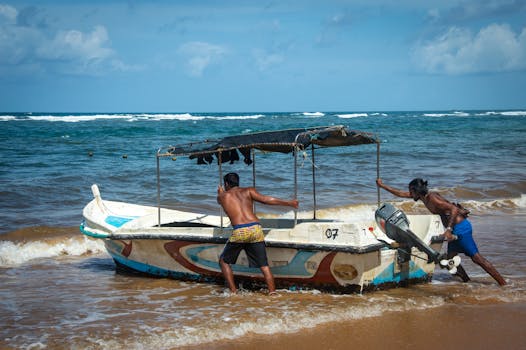Recognising the Contributions to the Development of Sustainable Fisheries and Aquaculture in Cape Verde
Cape Verde, an archipelago with a vast exclusive economic zone (EEZ), depends heavily on marine resources for its economy and food security. Fishing and aquaculture play a crucial role in the livelihoods of many coastal communities. However, overfishing, climate change and unsustainable practices pose significant challenges for the future of these sectors. This article aims to recognise and highlight the contributions of individuals, organisations and initiatives that are promoting the development of sustainable fishing and aquaculture in Cape Verde.
The Importance of Sustainability in Fishing and Aquaculture
Sustainability in fishing and aquaculture is not only an environmental issue, but also an economic and social one. Sustainable practices guarantee the availability of resources for future generations, protect marine biodiversity and promote the economic development of local communities.
- Preservation of resources: Prevent overfishing and ensure the recovery of fish populations.
- Protecting the Marine Ecosystem: Minimising the impact of fishing and aquaculture on marine habitats.
- Economic Development: Create jobs and sustainable income opportunities for coastal communities.
- Food safety: Ensuring access to nutritious and affordable food for the population.
Notable Initiatives and Contributions
Various initiatives and individuals have played a key role in promoting sustainable fishing and aquaculture in Cape Verde. These contributions range from scientific research and policy implementation to the development of innovative technologies and the involvement of local communities.
Scientific Research and Monitoring
Scientific research is essential to understanding the state of marine resources and the impact of fishing activities. The National Fisheries Development Institute (INDP) has played a crucial role in monitoring fish populations, assessing the environmental impact of fishing and identifying sustainable fishing practices.
Example: INDP has carried out studies on the abundance and distribution of tuna, one of the main fish species caught in Cape Verde. These studies help inform fisheries management decisions and ensure that tuna fishing is sustainable.
Policy Implementation and Regulation
The Cape Verdean government has implemented policies and regulations to promote sustainable fishing, including setting fishing quotas, banning destructive fishing practices and creating marine protected areas.
Example: The creation of marine protected areas (MPAs) on several of Cape Verde's islands has helped to protect marine habitats and promote the recovery of fish populations. These MPAs also offer opportunities for ecotourism and the economic development of local communities.
Development of Innovative Technologies
The development and adoption of innovative technologies can help reduce the environmental impact of fishing and increase the efficiency of aquaculture. This includes the use of selective fishing gear, remote monitoring systems and sustainable aquaculture techniques.
Example: The use of fishing nets with larger meshes can help reduce the catch of juvenile fish and other non-target species, minimising the impact of fishing on marine ecosystems.
Involvement of Local Communities
The involvement of local communities is fundamental to the success of any sustainable fishing and aquaculture initiative. Local communities have valuable knowledge about marine resources and can play an important role in fisheries management and monitoring.
Example: In some coastal communities in Cape Verde, local fishermen are working together with the authorities to monitor fish populations and enforce fishing regulations. This involvement of local communities helps to ensure that fishing is sustainable and that the benefits are shared fairly.
Future Challenges and Opportunities
Despite the progress made, sustainable fishing and aquaculture in Cape Verde still face a number of challenges, including overfishing, climate change, lack of financial resources and limited enforcement capacity.
- Overfishing: Overfishing continues to be a threat to fish populations in Cape Verde.
- Climate Change: Rising water temperatures, ocean acidification and rising sea levels are affecting marine ecosystems and reducing fishing productivity.
- Lack of resources: The lack of financial and human resources limits the ability to implement and monitor sustainable fishing policies.
However, there are also significant opportunities to promote sustainable fishing and aquaculture in Cape Verde, including developing new technologies, strengthening ecosystem-based fisheries management and increasing the involvement of local communities.
Conclusion
The development of sustainable fishing and aquaculture in Cape Verde is essential to guarantee food security, economic development and the protection of marine ecosystems. The contributions of individuals, organisations and initiatives that are promoting sustainable practices are fundamental to the success of this effort. By recognising and supporting these contributions, we can ensure that fishing and aquaculture in Cape Verde are sustainable for future generations.
It is crucial to continue investing in scientific research, the implementation of effective policies, the development of innovative technologies and the involvement of local communities in order to face the challenges and take advantage of future opportunities. Collaboration between the government, the scientific community, the private sector and local communities is essential to building a sustainable future for fisheries and aquaculture in Cape Verde.
Recognise contributions to sustainable fishing and aquaculture! Find out more and take part: Find out how.
Application deadline: 30 June 2025.


